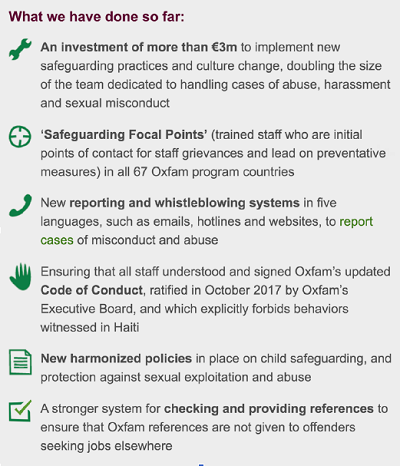Alara Gokceoglu, Policy & Research Officer at Campbell Tickell discusses the lessons learned from sexual misconduct allegations against Oxfam.
The sexual misconduct allegations against Oxfam’s staff working in Haiti in 2017 provoked a re-analysis of safeguarding procedures across the charity sector. The Charity Commission opened a statutory investigation in February 2018, with concerns that Oxfam had not “fully and frankly disclosed material details” on the alleged misconduct of staff members.
Here are three key lessons that organisations can learn from Oxfam’s experience.
Lesson 1: Prioritisation
Safeguarding must be prioritised through dedicated resources to enhance capabilities. This goes beyond financial investment and includes re-enforcing safeguarding measures daily. Organisations should embed preventative practices, such as training in safeguarding for staff and recruitment-vetting procedures.
Prioritisation also concerns the actions of the leadership team who are able to encourage and implement the right safeguarding culture. They should retain oversight of dispersed locations by requesting consistent reporting of incidents and tracking of safeguarding activities. An effective and capable safeguarding team is key to supporting the leadership team in these aims.
Lesson 2: Fostering A Culture Of Trust
Organisations must promote a culture of trust by developing appropriate accountability models. The inquiry found that a culture of tolerance of poor behaviour stops victims from reporting incidents. Of importance is appropriate reaction to early-warning signs, and transparency in the reporting of safeguarding issues to donors and regulators when concerns arise. This can often be difficult for charities as they rely on public and donor support. Therefore, concerns about damaging an organisation’s reputation can be a barrier to transparency when problems arise.
A culture of trust must be built among the public, donors and regulators by putting the interests of any victims and survivors at the core of the organisation’s purpose.
Lesson 3: Reporting Mechanism & Accountability
The Oxfam case showed a lack of appropriate reaction to early-warning signs. Therefore, there should be clear reporting mechanisms for staff members, beneficiaries, witnesses and the wider community to use when they have a safeguarding concern. There should be several routes to reporting, which the organisation should clearly communicate.
It should also promote and enhance awareness of the right to be protected by and from the organisation’s activities and actions. Such mechanisms would allow the voices of victims or survivors to be heard, build greater trust between the community and the organisation and, importantly, enable managerial oversight.
A proposed safeguarding model

Oxfam’s Safeguarding in action update, August 2019
It was recommended that Oxfam develop a more enhanced model, which would have clearer processes to allow for more effective safeguarding, transparency and accountability.
Read in full how Oxfam’s learning led to a ‘new safeguarding operating model’ as set out in Appendix D of the Oxfam GB Independent Safeguarding Review. This is a good starting point for other organisations wishing to enhance their approach.
There are vital lessons for all international and domestic charities, as well as the public sector, social work, education, health and care systems, where power imbalances between service provider and beneficiary warrant stronger safeguarding measures.
To discuss this article, contact Radojka Miljevic: radojka.miljevic@campbelltickell.com
This article is also featured in the latest CT Brief – Diversity focus
| Campbell Tickell is an established management and recruitment consultancy, operating across the UK and Ireland, focusing on the housing, social care, local government, sport, leisure, charity and voluntary sectors.
We are a values-based business and firmly place the positioning of our support and challenge on helping organisations to attain change that is well thought through, planned and sustainable. We want to help organisations create the landscape within which we ourselves would like to exist: fair, inclusive, diverse, engaged and transparent. We build from our values in how we approach all our work as a practice. Find out more about our governance services |


